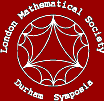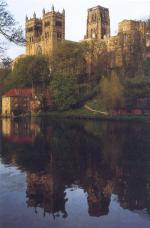 |
| Home |
| Outline |
| Participants |
| Programme |
| Online Talks |
| Abstracts |
 |
| London
Mathematical Society Durham Symposium |
| Recent Developments in Random Walks |
| Monday 2nd July - Thursday 12th July 2007 |
| Outline Random walks have been objects of intensive study by mathematicians over many decades with a well developed classical theory now in place. In recent years there have been a number of advances in this area which have spurred on research and have seen exciting progress on some novel problems. This workshop will cover recent work on random walk across a broad spectrum of activity but will have some major themes of focus. The key areas that we wish to focus on are specifically random walks in random media, random walks on groups and random walks with self-interaction. Our aim is to ensure that all are aware of new techniques and the challenges that are arising for our areas of focus. By bringing together a broad range of random walk experts we have the potential to provide significant impact on the development of these rich areas of research.
Central Themes Random walks in random environment: Self-interacting random walk:
Random walks on graphs and groups: |
| Organising Committee: Ben Hambly (Oxford University) Laurent Saloff-Coste (Cornell University) Pierre Tarrès (Oxford University) |